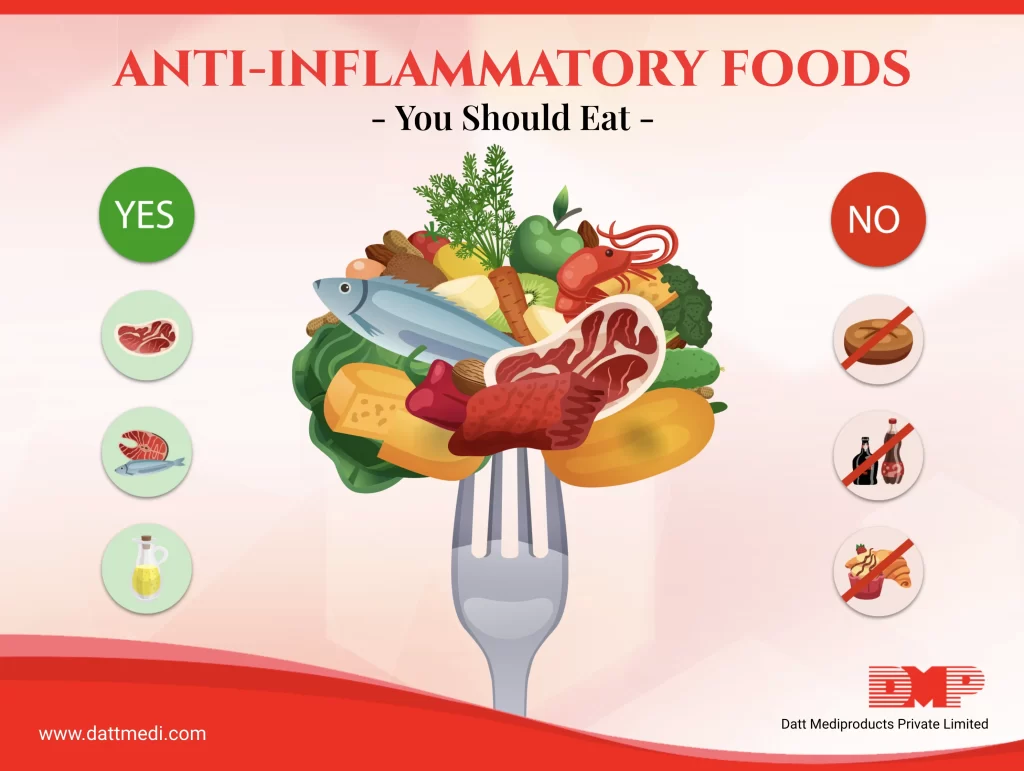
Inflammation is imperative to the healing process. Although it’s a part of our body’s natural defense mechanism, it sometimes becomes an enemy when it spreads throughout the body and persists for a longer time period. It’s not always the medical supplies which help combat this problem but several grocery choices can also impact inflammation in our body.
Inflammation is associated with several indications such as rheumatoid arthritis, Psoriasis, asthma, eosinophilic esophagitis, Crohn’s disease, colitis, inflammatory bowel disease, lupus, Hashimoto’s disease, and metabolic syndrome.
Our dietary choices can help manage their symptoms. An anti-inflammatory diet may also serve as an adjunctive therapy for these health conditions which tend to worsen with chronic inflammation.
We, Datt Mediproducts bring to you certain foods which may help reduce the effects of inflammation.
BERRIES:
Berries contain several phenolic compounds such as anthocyanins, flavonols, tannins and ascorbic acid which are responsible for numerous health benefits such as the prevention of inflammatory disorders, cardiovascular indications, along with protective effects in lowering the risk of various cancers. The same has been documented in various studies, one of which is published in the International Journal of Molecular Sciences titled “Bioactive Compounds and Antioxidant Activity in Different Types of Berries”.
TURMERIC:
It is a magnificent Indian spice with extraordinary benefits. Turmeric contains Curcumin which not only reduces inflammation naturally, but also decreases symptoms like pain, swelling or redness associated with the inflammatory process.
WALNUTS & ALMONDS:
A rich source of Omega-3 fatty acids, which help combat inflammation; alpha-linolenic acid and phenolic antioxidants to scavenge free radicals; and certain enzymes which inhibit the release of pain & swelling causing neurotransmitters.
GREEN LEAFY VEGETABLES:
Leafy veggies especially spinach make for great anti-inflammatory foods as it is extremely rich in antioxidants Vitamin A, Vitamin E and Vitamin K. These protect the body against free radical ,cell damage and pro-inflammatory cytokines. The phytochemicals like calcium, iron and fiber present in Dark vegetables like kale and broccoli also have disease fighting ability.
FATTY FISH:
Fatty fish boast high amounts of the omega-3 fatty acids EPA and DHA, which reduce inflammation thereby helping in conditions like metabolic syndrome, heart disease, diabetes, and kidney disease
The list is not confined to these but there are several other foods having anti-inflammatory properties such as tomatoes, avocados, green tea, figs, basil, dark chocolate, peppers, flaxseeds etc.
Food to Avoid:
– Processed foods, carbs such as white bread, white pasta, pastries
– Foods with extra sugar or salt; soda or other sugar sweetened beverages
– Unhealthful oils
– Processed snack foods, like chips, crackers, french fries
– Ready made desserts, such as cookies & candies
– Excess alcohol, smoking
Some Useful Anti-inflammatory Diet Tips:
– Incorporate a variety of fruits, vegetables, and healthful snacks in your diet.
– Choose healthful, homemade lunches over fast food meals.
– Prefer to drink normal distilled or mineral water, rather than a soda or other sugary beverages.
– Take supplements, such as cod liver oil or multivitamins (as recommended by a physician).
– Exercise for at least 30 minutes on a daily basis.
– Have a sound sleep, as poor sleep has a tendency to worsen inflammation.
We @Dattmediproducts understand that no single food has the ability to boost a person’s health. A person’s diet should be a combination of a variety of healthy ingredients rich in nutrients, antioxidants and healthful fats.
Eat Healthy, Stay Fit!




